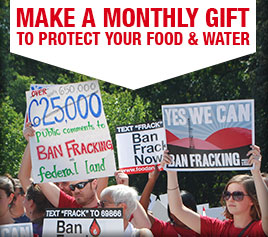Fracking
 Fracking for oil and natural gas is too dangerous: it threatens the water we drink, the air we breathe, and our health. It also accelerates climate change. That’s why we need to ban fracking now.
Fracking for oil and natural gas is too dangerous: it threatens the water we drink, the air we breathe, and our health. It also accelerates climate change. That’s why we need to ban fracking now.
What is Fracking?
| How You Can Help |
|---|
| The only way we can stop the dangers of fracking is to ban the practice entirely. TAKE ACTION |
Fracking, also called “hydraulic fracturing,” is a destructive process that corporations like Halliburton, BP and ExxonMobil use to extract natural gas and oil from rock that lies deep underground. They drill a deep well and inject millions of gallons of toxic fracking fluid – a mix of water, sand and harsh chemicals – at a high enough pressure to fracture the rock and release the oil or gas.
Fracking is exempt from major environmental laws, including the Safe Drinking Water Act, and spills and accidents are far too common.
What’s Wrong With Fracking?
The entire process of fracking — from drilling a well to transporting waste — endangers our water and the health of our communities. There is clear evidence of the growing damage caused by fracking:
- Some people who live near fracking sites have become seriously ill from drinking contaminated water. Others can light their tap on fire due to the amount of methane in their water.
- The oil and gas industry isn’t required to disclose the chemicals they use in the fracking process, but many are known endocrine disruptors and carcinogens.
- Communities with fracking have seen declines in property values, increases in crime, and losses in local tourism and agriculture.
- Methane, a potent greenhouse gas that contributes to climate change, leaks from fracking industry sites.
And that’s just the beginning. Learn more about how fracking hurts our water, our air, and our communities.
What You Can Do: Take Action to Ban Fracking
We can – and must – put a stop to fracking. You can help: Sign the petition to ban fracking now.
Across the globe, communities are demanding an immediate ban on this dangerous practice. Already, we have:
- Passed hundreds of measures against fracking, wastewater disposal and frac sand mining in communities across the United States.
- Upheld bans on fracking in Bulgaria and France, despite intensive pressure from industry.
- Successfully held off fracking in places like New York State, where it once seemed inevitable.
Food & Water Watch works across the United States to help local communities protect themselves from fracking. See where we’ve passed local bans, and how you can help ban fracking in your community. Has fracking affected you personally? Share your story to help fight back.
As a step towards banning fracking nationally, Food & Water Watch is calling for a ban on fracking on all U.S. public lands, including national forests. Learn how fracking threatens our national parks and forests, and how you can protect them.
We’re up against big corporations with deep pockets. You can help by donating to help us stand up against them.

